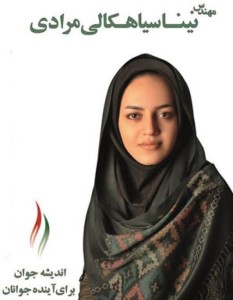
A 27-year-old woman has lost a seat on the Qazvin City Council when election officials ruled she was too sexy to serve.
Her election poster shows a very attractive young woman in full compliance with the Islamic dress code. No hair is exposed; she does not appear to be wearing any makeup and she clearly does not have the fake eyelashes that are so popular among many Iranian women.
But the election authorities have ruled that she has “violated Islamic norms” and thus disqualified herself from holding elective office.
Nina Siahkali Moradi, who holds an engineering degree and is now a graduate student in architecture at Qazvin’s Azad University, was among 163 candidates vying for the 13 seats on the Qazvin City Council in the June 14 election. She came in 14th. Under Iranian law, she was first in line to become a City Council member if any of the 13 who won election died, resigned or was expelled from office.
And that has now happened. One of the victors has been chosen to be mayor of Qazvin and has thus vacated his City Council seat, opening it for Moradi. But the election authorities then voided her election.
An unnamed Qazvin official was quoted in the local press as saying, “We don’t want a catwalk model on the council.”
Moradi was thought to have successfully mobilized a lot of young people to vote for her in June. Her slogan was: “Young ideas for a young future.” She spoke of invigorating women’s rights in Qazvin and of restoring the historic section of the city. She also called for a greater say by Qazvin youth in town planning.
The opposition to her taking the seat to which she is now entitled appears to have come from conservative religious figures. News reports said a coalition of religious groups had written the city governor condemning Moradi’s “vulgar and anti-religious posters.” The campaign poster they cited accompanies this article.
Moradi said, “Almost 10,000 people voted for me and, based on that, I should be the first alternate member of the City Council.”
Others supported her elevation to the council, but in the end the election supervisory board voided her election, saying she “violated Islamic norms.”
Reza Hossaini, who is both a Majlis deputy and a member of the Qazvin election supervisory board, told the news agency IranWire, “Her votes have been nullified due to her disqualification, as the review board did not approve her credentials. We have told her the reason she has been disqualified.”
Moradi told reporters no one from the election board had given her any explanation.
Earlier she had been vetted by the Judiciary and the Intelligence Ministry and her name was put on the ballot as a qualified candidate. But that was before her campaign posters went up.
The International Campaign for Human Rights in Iran (ICHRI) said it had been told the campaign posters were the basis of her disqualification, and the posters were cited in the letter of complaint to the governor.
IranWire said the local authorities had confiscated the campaign posters of two other female candidates, Maryam Nakhostin-Ahmadi and Shahla Atefeh, and detained both for questioning.
Mohammad Olaiyehfard, a lawyer in Qazvin, said it was illegal for the city to nullify Moradi’s votes at this late date. He said the law allows a candidate to be disqualified before an election for not meeting the requirements or during the review of the election results for violating the election law. But he said that once the results have been certified, as they were weeks ago in Qazvin, no candidate may be retroactively disqualified and his or her votes nullified.
In the presidential campaign that ran at the same time as the City Council elections, candidate Hassan Rohani said, “Women work but don’t enjoy equal rights. I will form a women’s affairs ministry to return their trampled rights to them.” The creation of new ministries, however, is the province of the Majlis.